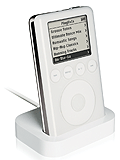podcasting
This article appeared as my column for Connect Magazine in October 2004.

On my commute I listen to a fantastic radio program about information technology. The program offers interviews with national figures in computing, commentary on trends, and even lengthy interviews with prominent historical figures in IT. What's interesting is that this radio program isn't available on the FM or even AM band-it's a podcast.
Podcasting is a term used to describe the recent phenomenon of pointcasting audio programs over the Internet to people's iPod for later listening. We're all familiar with the iPod; it's become an icon of the times: hip, fun, and progressive. Most people use the iPod, and other MP3 players, to listen to music. But, combine an iPod with the Internet and innovative things start to happen.
Podcasting arguably started with Doug Kaye's IT Conversations, at least that's where I came across it. Adam Curry (of MTV fame) and Dave Winer are doing a regular program now called Trade Secrets Radio. Others, like the Evil Genius Chronicles are getting in the act as well.
Podcasting is not streaming. For the most part, streaming requires large servers, special software, and lots of bandwidth which have limited the application of streaming to large companies.
Podcasting, on the other hand, takes advantage of relatively inexpensive technologies to achieve a similar result. Almost anyone with a computer and a good microphone can produce good quality audio using editing software that is cheap or even free. Consequently, hundreds of people have started to produce audio content for the Web. The problem remains: how do you get that content to listeners?
On the Internet, listeners are just a click away. Simply place your MP3 file on any HTTP server and link to it. This works great for one-off content, but what about regular shows? Getting the MP3 from the Web site to your iPod is the last mile problem of podcasting. I'm addicted to the Gillmor Gang on IT Conversations, but I'll never remember to download the program every week. I want the program to simply show up on my iPod so I can listen to it at my leisure. Enter RSS.
It's no secret to regular readers that I'm a fan of RSS. RSS has a feature called enclosures that allows attachments. IT Conversations, and other podcasters create RSS feeds with the MP3 files attached. Most RSS feedreaders will download the attachments, but they don't end up on your MP3 player. You still need to manually move it into iTunes, or whatever program you use to sync your MP3 player.
iPodder and similar applications have sprung up over the last few months to solve that problem. iPodder checks a list of RSS feeds on a scheduled basis and downloads any attachments right into iTunes. Anytime I hook my iPod up to my PowerBook, new MP3s are downloaded to my iPod. Very convenient.
How can you or your company take advantage of fast and efficient production and distribution of audio content on the Web? One way is to consider an audio blog. Audio blogs open up a whole new world since there are some people who'd rather talk than type and frankly are more interesting that way.
Companies can benefit from this as well. Here's one example: public companies, hold regular calls for investors that use large telephone bridges for hundreds of people. Many of these companies put the audio of those calls on the net right now, but think how much more effective this would be in an RSS feed. I could subscribe to the investor calls for companies I invest in and simply have them show up on my iPod, ready to listen to.
Doug Kaye has lamented that there are more audio blogs already than he can afford to listen to. That points out a limitation of audio: it's more linear than reading. I can read faster than you type; I can skim; I can skip. That's all harder to do in audio, especially with current tools. Still, the overall situation is not all that different-no matter how fast I read, I can't keep up with all the interesting information on text blogs either.
Podcasting will continue to evolve, but I'm convinced that this new way of listening will become more and more popular. Like the democratization of publishing brought on by blogging, podcasting removes barriers. Programs like IT Conversations would be nearly impossible to start in conventional radio, but with podcasting, anyone with a computer and a little initiative is on-the-air. Like Doug, I just wish I had more time to listen!
Phil Windley teaches Computer Science at Brigham Young University. Windley writes a weblog on enterprise computing at http://www.windley.com and is writing a book on digital identity. Contact him at phil@windley.com
Last Modified: Friday, 31-Dec-2004 23:18:59 UTC




